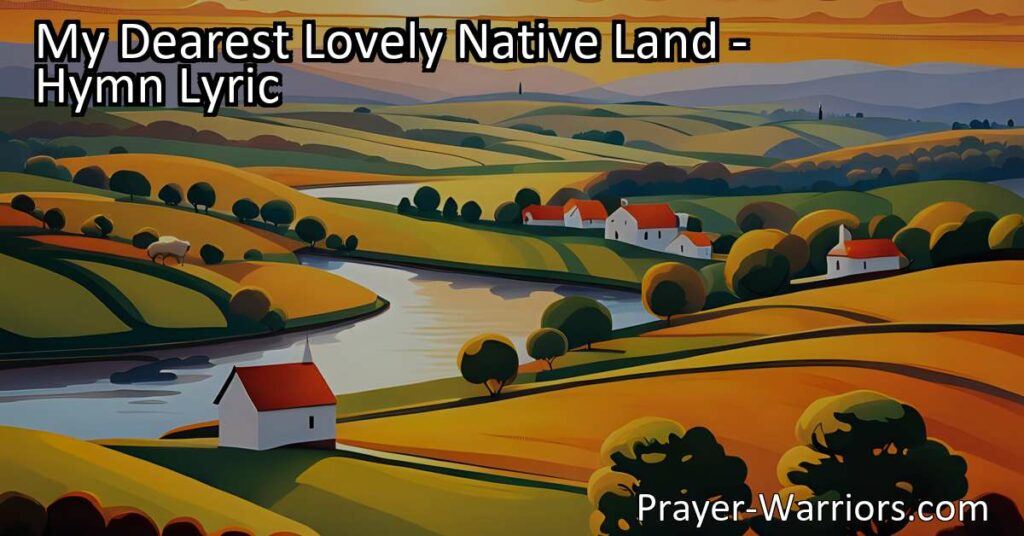My Dearest Lovely Native Land – Hymn Lyric
“My Dearest Lovely Native Land” is a heartfelt hymn that beautifully portrays the deep love and attachment one feels for their homeland. The poet cherishes the peace, pleasure, and cherished memories that make their native land irreplaceable. Though bidding farewell is difficult, their faith gives them the strength to embark on a new journey, carrying the essence of their beloved homeland wherever they go.
Table of Contents
My Dearest Lovely Native Land – Hymn Lyric
My dearest, lovely, native land,
Where peace and pleasure grow,
Where joy with fairest, softest hand,
Wipes off the tears of woe
Thy Sabbaths, laws, and happy shores,
And names, I love them well,
And looking o’er those richest stores,
How can I say, Farewell!
O sacred home, how sweet thou art,
And all thy scenes how dear!
Thou dost with chords entwine my heart,
And seem’st to say, “Stay here!”
Thou always didst an angel prove,
My youthful fears to quell,
Thou still art clad with smiles of love,
And can I say, Farewell!
My parents, brothers, sisters, friends,
My warm affection know,
And love from each my path attends,
And can I from them go?
The thoughts of days that now are past,
No pen or tongue can tell;
Though to my heart they cling so fast,
Yet I must say, Farewell!
No sighs of grief my bosom heave,
No tears of anguish roll:
My friends, my all, I gladly leave,
For Jesus cheers my soul.
Ye winds, then waft me far away,
The tale of love to tell;
To country, home, and friends I say,
Farewell, O! yes, Farewell!
Meaning of My Dearest Lovely Native Land
My Dearest Lovely Native Land: Cherishing the Beauty and Bond
Oh, my dearest lovely native land! How your peace and pleasure make my heart glow with joy. In your embrace, I find solace, where even the softest hand of joy wipes away the tears of woe. Your sabbaths, laws, and happy shores hold a special place in my heart, and as I look over your richest stores, I cannot fathom bidding you farewell.
Sacred home, you are truly sweet and all your scenes are so dear to me. You entwine my heart with chords of love and seem to whisper, “Stay here!” Throughout my life, you have been an angel, calming my youthful fears. Even now, you are adorned with smiles of love. How can I dare to say farewell to you?
My parents, brothers, sisters, and friends, they all know the depth of my affection for them. Love fills my path, accompanying me every step of the way. How can I possibly leave them behind? The memories of days past, filled with laughter and shared experiences, are etched in my heart, impossible to accurately capture with any pen or spoken word. They cling to me like a gentle embrace, making it even harder to bid farewell.
Yet, there are no sighs of grief that heave my bosom, and no tears of anguish that roll down my cheeks. For you see, my friends, my all, I gladly leave behind. Why, you may ask? Because Jesus cheers my soul, filling it with a boundless joy and peace. He is my constant companion, giving me the strength to embark on this journey.
So, ye winds, waft me far away, carrying the tale of love that I have nurtured within. I yearn to share my experiences, my memories, and my love for my dearest lovely native land. To distant countries and unfamiliar homes, I say farewell, oh yes, farewell.
As we delve deeper into the meaning of the hymn, “My Dearest Lovely Native Land,” we witness the essence of patriotism and love for one’s homeland. The poet’s words echo the sentiments felt by many individuals who feel a deep connection to their native land and all its cherished attributes.
In every country, there is a unique combination of culture, traditions, and history that make it irreplaceable in the hearts of its inhabitants. The hymn beautifully portrays this bond by describing the land as “dearest,” “lovely,” and “native.” It signifies a profound affection and attachment to a place that has shaped the poet’s identity and brings immense joy to their life.
The mention of peace and pleasure growing in this native land reflects the desire for tranquility and happiness within society. A homeland that can provide its citizens with these qualities is truly blessed. The hymn reminds us of the importance of cherishing such gifts and working towards their preservation.
The Sabbath, laws, and happy shores are symbols of the values and principles that govern the land. The poet expresses their love for these aspects, highlighting their significance in creating a harmonious and prosperous society. These elements form the foundation upon which the native land stands, and bidding farewell to them becomes a challenging task.
The hymn also evokes the connection between the poet and their beloved homeland. It is described as entwining their heart with chords of love. This emotional entanglement signifies an unbreakable bond, one that cannot easily be severed. The native land becomes a part of their identity, filling them with a sense of belonging and fulfillment.
Furthermore, the hymn emphasizes the role played by family, friends, and loved ones in shaping this attachment to the native land. They are described as knowing the poet’s warm affection and being recipients of their love. The presence of these relationships strengthens the bond with the homeland, making it even more difficult to leave behind.
The memories of days past, shared with loved ones, hold a special place in the poet’s heart. These cherished moments are described as clinging fast, illustrating their lasting impact. Such memories evoke sentiments of nostalgia and a longing to preserve the connections built within the native land.
However, despite the overwhelming love for their homeland, the poet finds solace in their faith. They believe that Jesus cheers their soul, giving them the strength to bid farewell to their loved ones and embark on a new journey. This spiritual support becomes a source of comfort and courage, reminding them that they are never alone.
As the poet prepares to embark on this new journey, they say farewell not with sighs of grief or tears of anguish but with a sense of peace and contentment. The love for their homeland remains, but it is accompanied by a sense of purpose and an eagerness to share their experiences with others.
In conclusion, “My Dearest Lovely Native Land” encapsulates the deep love and affection one feels for their homeland. It speaks of the cherished attributes and memories that make a native land truly special. The hymn reminds us to value our culture, traditions, and relationships within the context of our nations. It teaches us to appreciate the peace and pleasure that our native lands provide and to carry their essence with us wherever we go. Farewell may be difficult, but the bonds we have forged will forever remain in our hearts.
I hope this hymn inspired image brings you hope and peace. Share it with someone who needs it today!



